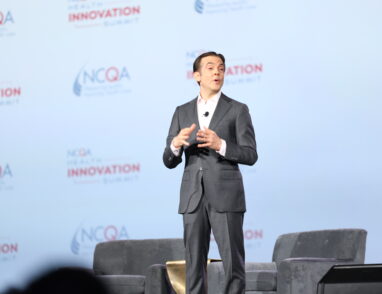Kids Smiles: Solving Data Challenges for Health Equity Accreditation
May 5, 2025 · Becky Kolinski
We’re excited to share the story of Kids Smiles—the first dental clinic to earn NCQA’s Health Equity Accreditation. Data is key to measuring and improving health outcomes for individuals and communities—yet organizations struggle to collect the data they need. With persistence and creativity, Kids Smiles solved its data challenges to improve the quality of care for the kids and families it serves.
Kids Smiles expands the practice of oral health care in underserved communities by providing clinical care and education, and partnering with community organizations to create positive health behaviors. It serves 18,000 patients annually in three dental clinics in the Philadelphia area, offering unique programs such as:
- Oral health education and screenings in more than 200 schools, day care facilities, HeadStart programs and community organizations.
- An inclusive dental clinic with specially trained staff to provide care for children with disabilities.
- Access to a “soft food” pantry for families that need short-term help after a child’s dental treatment.
“We chose NCQA’s Health Equity Accreditation because it aligns with our mission to increase access to oral health care, and to do that fairly and equitably,” says Cheryl Janssen, Kids Smiles’ Chief Executive Officer. “The families we serve are dealing with so many issues—poverty, lack of transportation, food insecurity—that oral health care sometimes falls off their radar. We want to help them make the care more routine.”
Getting Started With Health Equity Accreditation
Kids Smiles learned about NCQA’s Health Equity Accreditation program through its funding partner, the Independence Blue Cross (IBX) Foundation. A longstanding funder of health care access in underserved communities, the IBX Foundation developed an initiative for private, non-profit health centers to pursue Accreditation.
“Health Equity Accreditation recognizes the value that health centers provide, and ensures alignment with health plans, heath systems and other partners,” says Heather Major, Executive Director at the IBX Foundation. “It also enables Kids Smiles and other health care safety net providers to deliver even better care to their patients.”
The IBX Foundation launched planning grants in 2022 to help organizations explore their readiness for Accreditation. After successfully completing the planning phase, Kids Smiles started the survey process in 2023, and was awarded Provisional Accreditation in 2025.
“The Accreditation process helped us formalize policies and procedures, and provide a more consistent patient experience across our clinics,” says Erika Sands, Kids Smiles’ Development Director. “The training we developed for our staff helped them understand the obstacles our patients face and how we can support them.”
Training is especially useful for new employees. It creates a common framework for health equity, and helps employees understand the organization’s mission and values.
Overcoming Data Challenges
Like many organizations, Kids Smiles experienced data-related challenges. Its dental practice management software lacked robust data collection and reporting tools, making it difficult to assess patient outcomes. With limited resources, the team needed to get creative.
“Dental software does not have the same functionality as a medical platform,” says Mike Pugliese, Kids Smiles’ Chief Operating Officer. “Information on race, ethnicity and language spoken can be input, but there is not a single report that allows us to get the data out of the system.”
With help from a board member with IT experience, Kids Smiles implemented a third-party software tool on top of its existing clinical software that allowed the team to access and run reports on patient race, ethnicity and spoken language data.
“Now we can tell how many patients in each zip code speak a certain language, and that can inform our hiring decisions,” says Pugliese. “We can see where we might need to hire a dentist that speaks Russian or Mandarin, for example, because there’s something lost when you’re talking to an iPad and relying on a third person to translate your conversation with the patient.”
Lessons Learned: What It Takes to Succeed
Organizations that are interested in pursuing Health Equity Accreditation—especially small non-profits—can learn from Kids Smiles’ experience.
- Start with the standards. “I would advise any organization to start by reviewing the NCQA standards,” says Sands. “I think they’ll be surprised by how much they are already doing, and they’ll quickly identify the gaps and areas they need to expand upon.”
- Delve into the data. “Even on a small team, you need someone with an understanding of software and information technology,” says Pugliese. “The data component is critical for success.”
- Get organized. “It is essential to have someone on your team who is diligent and can manage the details,” says Janssen. “You’ll also need a project champion to help keep everyone focused on the larger vision for health equity.”
- Seek out funding. “Small organizations need funding and resources to do this work,” says Janssen. “If more foundations follow the example of the IBX Foundation, it could have a huge impact.”
Kids Smiles proves that any organization can achieve Health Equity Accreditation—regardless of its size or resources. “The team at Kids Smiles demonstrates a commitment to continuous improvement, and they’ve done an excellent job raising awareness about pediatric dental care as one of the greatest unmet health care needs,” says Major.
Learn More
- Visit the Kids Smiles website to learn more about its programs and services.
- Visit the IBX Foundation website or contact ibxfoundation@ibx.com to learn how to replicate its health equity programs in your community.
- Visit the NCQA website to learn more about Health Equity Accreditation.








